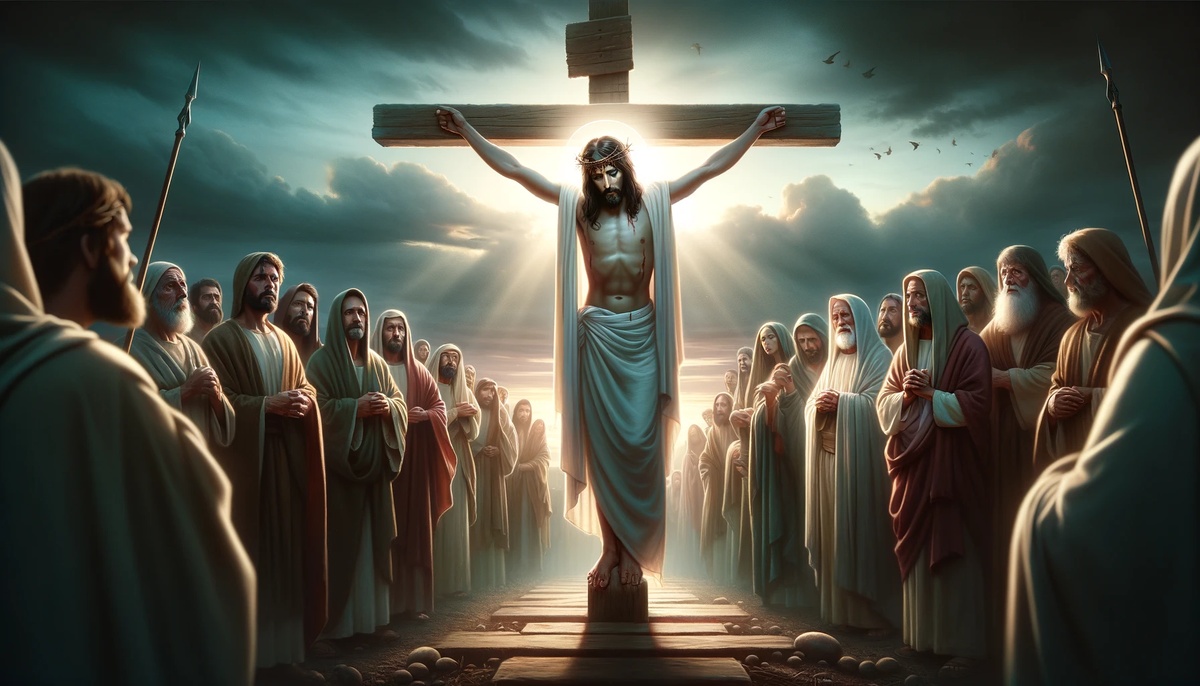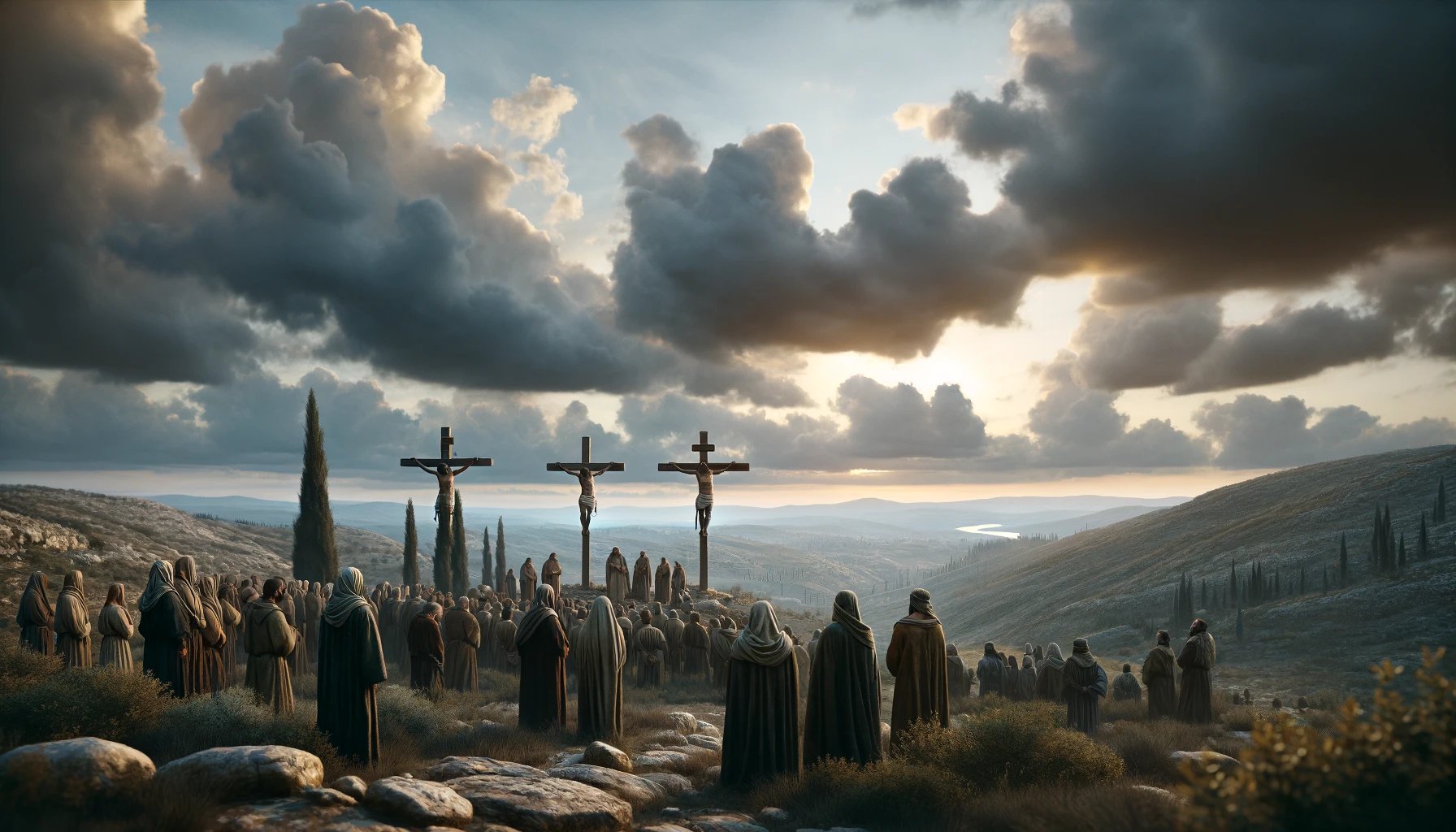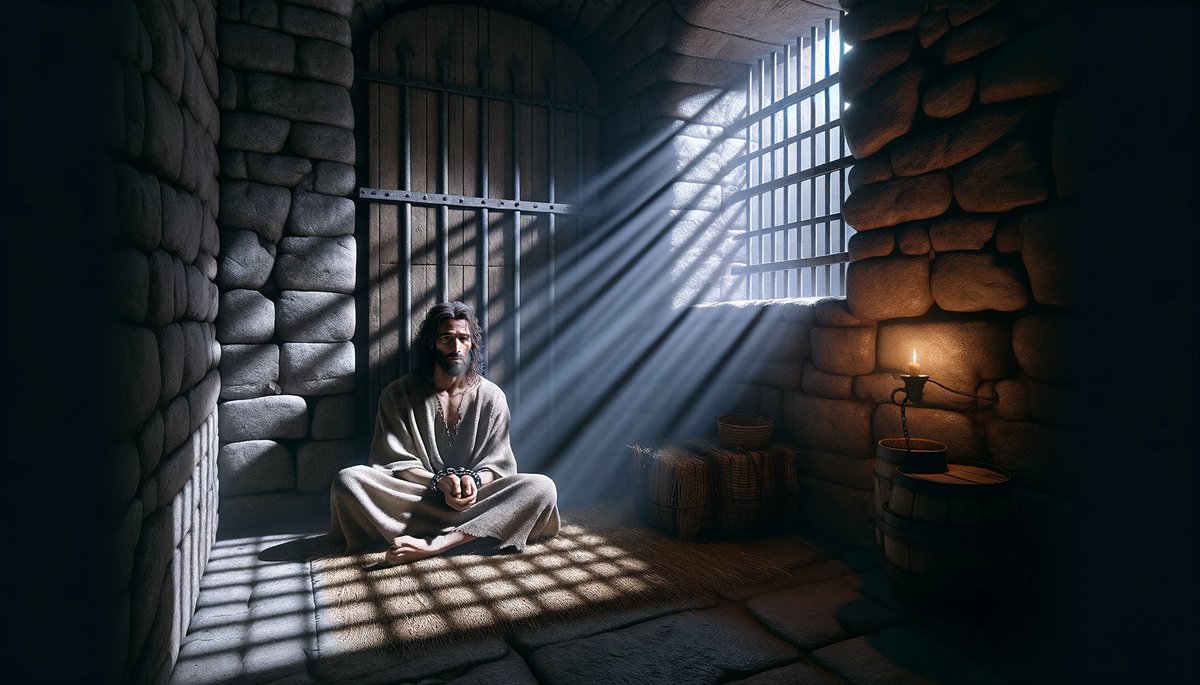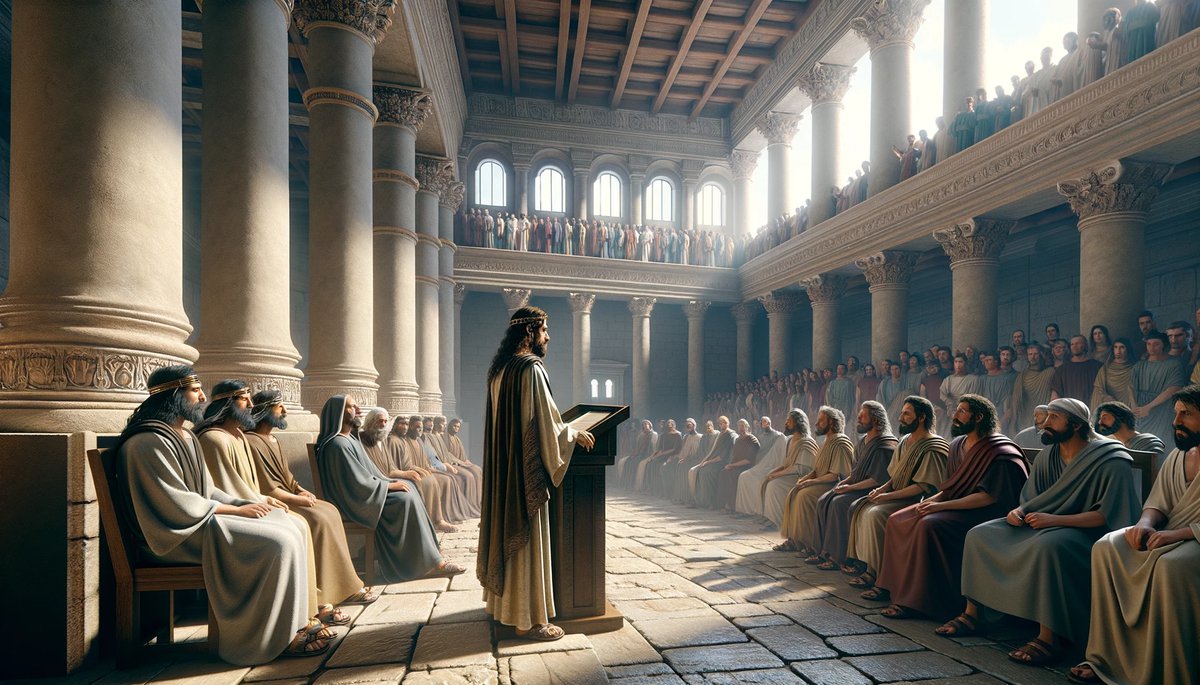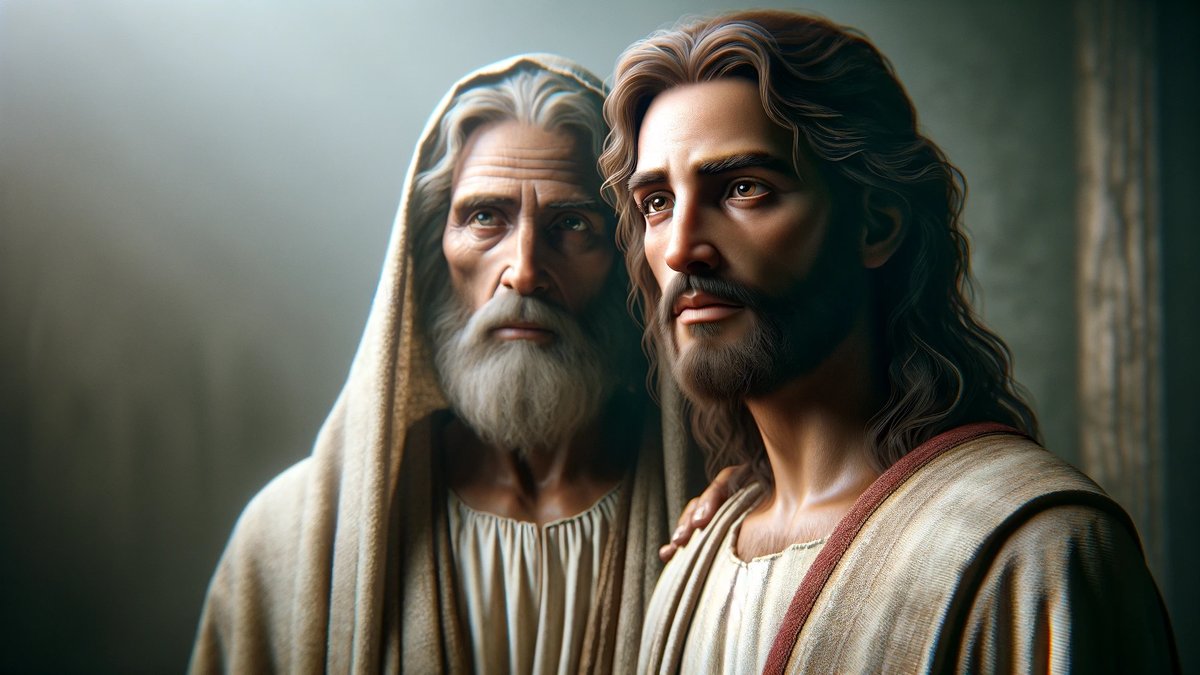Home>Theology and Spirituality>Was John The Baptist Alive When Jesus Was Crucified


Theology and Spirituality
Was John The Baptist Alive When Jesus Was Crucified
Published: February 23, 2024
Ericka Andersen, an editor at Christian.net, expertly merges digital strategy with content creation, focusing on faith and societal issues. Her communication skills enhance the platform's engaging narratives, fostering meaningful dialogue on belief's impact on society.
Explore the theological significance of John the Baptist's life in relation to Jesus' crucifixion. Delve into the spiritual implications of their connection.
(Many of the links in this article redirect to a specific reviewed product. Your purchase of these products through affiliate links helps to generate commission for Christian.net, at no extra cost. Learn more)
Table of Contents
Introduction
The relationship between John the Baptist and Jesus Christ is a profound aspect of Christian theology and spirituality. Their intertwined lives, ministries, and the timing of their respective deaths have sparked curiosity and contemplation among scholars, theologians, and believers for centuries. One question that often arises is whether John the Baptist was alive when Jesus was crucified.
Exploring this inquiry delves into the historical and biblical narratives surrounding these two influential figures. It invites us to consider the interconnectedness of their missions and the divine orchestration that underpins their roles in the grand narrative of salvation.
In this article, we will embark on a journey through the lives of John the Baptist and Jesus, examining the pivotal moments that defined their earthly existence. We will navigate the historical and biblical evidence to shed light on the timing of John the Baptist's death in relation to the crucifixion of Jesus. By doing so, we aim to gain a deeper understanding of the profound spiritual significance inherent in the lives and destinies of these two extraordinary figures.
Read more: What Religion Was Jesus When He Was Alive?
The Life and Ministry of John the Baptist
John the Baptist, also known as John the Forerunner, holds a significant place in Christian history and spirituality. His life and ministry were marked by a profound sense of purpose and a calling to prepare the way for the coming of the Messiah. John's birth was foretold by the angel Gabriel to his father, Zechariah, a priest of the order of Abijah, and his mother, Elizabeth, who was a relative of Mary, the mother of Jesus.
From his early days, John was destined for a unique role in the divine plan. He lived a humble and ascetic life, dwelling in the wilderness and subsisting on a diet of locusts and wild honey. His attire, a garment of camel's hair secured by a leather belt, reflected his simplicity and detachment from worldly comforts.
John's ministry was characterized by a compelling message of repentance and the imminent arrival of the Messiah. He preached with fervor and conviction, calling people to turn away from sin and be baptized as a symbol of their commitment to spiritual renewal. Multitudes flocked to the banks of the Jordan River to heed his call, and many were baptized by him, including Jesus himself.
The baptism of Jesus marked a pivotal moment in John's ministry. As Jesus emerged from the waters, the heavens opened, and the Spirit of God descended like a dove, affirming Jesus as the beloved Son of God. This profound encounter solidified John's awareness of Jesus' divine identity and inaugurated the public manifestation of Jesus' earthly ministry.
John fearlessly confronted the religious authorities of his time, challenging them to embrace genuine repentance and warning them of the impending judgment. His unwavering commitment to truth and righteousness ultimately led to his imprisonment by Herod Antipas, the tetrarch of Galilee and Perea. Despite his confinement, John continued to exhort and inspire his followers, remaining steadfast in his dedication to preparing the way for the Messiah.
The life and ministry of John the Baptist exemplify unwavering faith, uncompromising devotion to his divine calling, and a profound humility that positioned him as a herald of the coming Messiah. His selfless commitment to paving the way for Jesus' ministry underscores the profound significance of his role in the grand narrative of salvation, setting the stage for the transformative impact of Jesus' redemptive mission.
Through his exemplary life and powerful proclamation, John the Baptist continues to inspire and challenge believers to embrace repentance, prepare their hearts for the Lord, and bear witness to the light of Christ in a world longing for spiritual awakening and renewal.
The Crucifixion of Jesus
The crucifixion of Jesus stands as the central event in Christian theology, representing the pinnacle of God's redemptive plan for humanity. It was a harrowing and transformative moment that reverberates through the annals of history, shaping the faith and hope of countless believers across the globe.
The crucifixion took place outside the walls of Jerusalem, at a site known as Golgotha, or the Place of the Skull. It was a brutal form of execution reserved for the most heinous criminals, designed to inflict maximum suffering and public humiliation. Jesus, the embodiment of divine love and mercy, willingly submitted to this excruciating ordeal, bearing the weight of humanity's sins upon his shoulders.
The sequence of events leading to the crucifixion unfolded with profound significance. Jesus, betrayed by one of his disciples, endured a night of agonizing prayer in the Garden of Gethsemane before being arrested by the temple guards. He faced a series of unjust trials, marked by mockery, false accusations, and the relentless pursuit of his conviction by the religious authorities.
The Roman governor, Pontius Pilate, ultimately succumbed to the pressure of the crowd and sentenced Jesus to death by crucifixion. The journey to Golgotha, carrying the heavy wooden cross, epitomized the physical and emotional anguish that Jesus bore on behalf of humanity. At the site of crucifixion, Roman soldiers nailed him to the cross, and he hung between two criminals, enduring excruciating pain and scorn.
Amidst the darkness and agony, Jesus uttered profound words of forgiveness and compassion, extending grace even to those who crucified him. The sky darkened, the earth trembled, and the veil of the temple was torn, signifying the profound cosmic implications of this sacrificial act.
The crucifixion of Jesus represents the ultimate expression of God's love and the fulfillment of ancient prophecies concerning the Messiah's redemptive mission. It serves as a profound symbol of atonement, reconciliation, and the triumph of light over darkness, offering hope and salvation to all who embrace the message of the cross.
The significance of the crucifixion extends far beyond a historical event; it embodies the eternal truth of God's redemptive love and the transformative power of Christ's sacrifice. Through the crucifixion, Jesus bore the sins of humanity, offering a path to forgiveness, restoration, and eternal life. It stands as the cornerstone of Christian faith, inspiring believers to embrace the message of redemption and share the boundless love of Christ with a world in need of hope and healing.
The Timing of John the Baptist's Death
The timing of John the Baptist's death holds profound significance in the context of Jesus' earthly ministry and the unfolding of divine providence. According to the biblical narrative, John the Baptist met his tragic end during the reign of Herod Antipas, the tetrarch of Galilee and Perea. The circumstances surrounding his death are intricately intertwined with the political dynamics and moral complexities of the era.
Historical accounts and biblical records converge to provide insights into the events leading to John the Baptist's demise. The Gospel of Matthew (14:1-12) and the Gospel of Mark (6:14-29) offer detailed narratives of the circumstances that culminated in John's execution. These accounts depict a confluence of power, intrigue, and personal vendettas that ultimately sealed John's fate.
Herod Antipas, influenced by his unlawful relationship with Herodias, his brother Philip's wife, found himself entangled in a web of moral transgression and political maneuvering. John the Baptist fearlessly condemned this illicit union, denouncing Herod's actions and calling for repentance. Herodias, resentful of John's outspoken rebuke, harbored a deep-seated grudge against him, fueling her desire for retribution.
The opportunity for Herodias to exact her vengeance arose during a lavish banquet held in honor of Herod's birthday. Her daughter, Salome, captivated the assembly with her dance, prompting Herod to make a rash and ill-fated vow. In a tragic turn of events, Herodias seized this moment to orchestrate John the Baptist's demise, leveraging her daughter's performance to demand the prophet's head on a platter.
The tragic outcome of this banquet sealed John the Baptist's fate, leading to his unjust and untimely death. The timing of this event, occurring during Jesus' earthly ministry, carries profound theological and spiritual implications. It underscores the interconnectedness of John's prophetic mission with the advent of the Messiah and the unfolding of God's redemptive plan.
The martyrdom of John the Baptist serves as a poignant reminder of the cost of proclaiming truth in the face of moral compromise and political expediency. His unwavering commitment to righteousness and his willingness to confront injustice at the highest levels of power exemplify the sacrificial nature of his calling.
The timing of John the Baptist's death, amidst the burgeoning ministry of Jesus, underscores the profound intertwining of their destinies. It foreshadows the ultimate sacrifice that Jesus, the Lamb of God, would offer for the redemption of humanity. This convergence of events amplifies the spiritual significance of John's life and death, illuminating the intricate tapestry of divine providence woven through the lives of these two extraordinary figures.
In contemplating the timing of John the Baptist's death, we are invited to reflect on the enduring legacy of his prophetic witness and the enduring impact of his courageous proclamation. His life and death continue to inspire believers to embrace unwavering faith, stand for truth, and prepare the way for the transformative power of the Gospel in a world yearning for redemption and hope.
Historical and Biblical Evidence
The historical and biblical evidence surrounding the lives of John the Baptist and Jesus Christ provides a compelling framework for understanding the interconnectedness of their destinies and the timing of John the Baptist's death in relation to the crucifixion of Jesus. Both secular historical accounts and the canonical Gospels offer valuable insights into the socio-political landscape, religious dynamics, and the prophetic fulfillment that characterized this pivotal era.
Secular historical sources, including the works of Jewish historian Flavius Josephus, provide corroborative details regarding the reign of Herod Antipas and the circumstances leading to John the Baptist's execution. Josephus' writings offer a glimpse into the political intrigues and power struggles that defined the Herodian dynasty, shedding light on the volatile backdrop against which John and Jesus carried out their ministries.
The canonical Gospels, particularly the accounts found in the synoptic Gospels of Matthew, Mark, and Luke, present a rich tapestry of historical and theological narratives that intersect with the lives of John the Baptist and Jesus. These accounts meticulously chronicle the events leading to John's imprisonment and subsequent martyrdom, offering profound insights into the moral, religious, and political tensions that precipitated his fate.
The Gospel of John, while focusing primarily on the ministry of Jesus, provides additional contextual clues regarding the relationship between John the Baptist and Jesus, further enriching our understanding of their intertwined missions.
The convergence of historical and biblical evidence serves to underscore the authenticity and significance of the narratives surrounding John the Baptist and Jesus. It illuminates the profound impact of their lives within the broader historical landscape of first-century Judea and Galilee, highlighting the enduring relevance of their message and mission.
By examining the historical and biblical evidence with discerning eyes, we gain a deeper appreciation for the divine orchestration that undergirds the lives of John the Baptist and Jesus. Their roles as herald and Messiah, respectively, unfold within the intricate tapestry of human history and divine providence, inviting contemplation and awe at the profound workings of God's redemptive plan.
The historical and biblical evidence surrounding John the Baptist and Jesus beckons us to embrace the enduring truths embedded within their lives, inspiring us to ponder the profound spiritual implications of their intertwined destinies and the transformative power of their legacies.
Read more: When Was John The Baptist’s Birthday
Conclusion
In conclusion, the inquiry into whether John the Baptist was alive when Jesus was crucified unveils a tapestry of interconnected destinies, divine providence, and profound spiritual significance. The lives of these two extraordinary figures, John the Baptist and Jesus Christ, intersect in a symphony of prophetic fulfillment, sacrificial witness, and redemptive purpose.
The life and ministry of John the Baptist exemplify unwavering devotion to his divine calling, a commitment to prepare the way for the Messiah, and a courageous proclamation of repentance and righteousness. His selfless dedication and unwavering faith positioned him as a herald of the coming Messiah, setting the stage for the transformative impact of Jesus' redemptive mission.
The crucifixion of Jesus stands as the central event in Christian theology, embodying the ultimate expression of God's love and the fulfillment of ancient prophecies concerning the Messiah's redemptive mission. It serves as a profound symbol of atonement, reconciliation, and the triumph of light over darkness, offering hope and salvation to all who embrace the message of the cross.
The timing of John the Baptist's death, amidst the burgeoning ministry of Jesus, underscores the profound intertwining of their destinies. It foreshadows the ultimate sacrifice that Jesus, the Lamb of God, would offer for the redemption of humanity. This convergence of events amplifies the spiritual significance of John's life and death, illuminating the intricate tapestry of divine providence woven through the lives of these two extraordinary figures.
The historical and biblical evidence surrounding the lives of John the Baptist and Jesus Christ provides a compelling framework for understanding the interconnectedness of their destinies and the timing of John the Baptist's death in relation to the crucifixion of Jesus. Both secular historical accounts and the canonical Gospels offer valuable insights into the socio-political landscape, religious dynamics, and the prophetic fulfillment that characterized this pivotal era.
In contemplating the profound spiritual implications of the lives and destinies of John the Baptist and Jesus, we are invited to embrace the enduring legacy of their prophetic witness, unwavering faith, and sacrificial commitment. Their intertwined lives serve as a timeless testament to the transformative power of divine purpose, the redemptive significance of Christ's sacrifice, and the enduring call to prepare the way for the Lord in every generation.
As we ponder the interconnectedness of John the Baptist and Jesus, we are drawn into a deeper awareness of the divine orchestration that undergirds the grand narrative of salvation. Their lives, ministries, and the timing of their respective deaths converge to form a profound tapestry of redemption, inviting us to embrace the timeless truths embedded within their legacies and to bear witness to the transformative power of the Gospel in a world yearning for hope, healing, and spiritual renewal.





